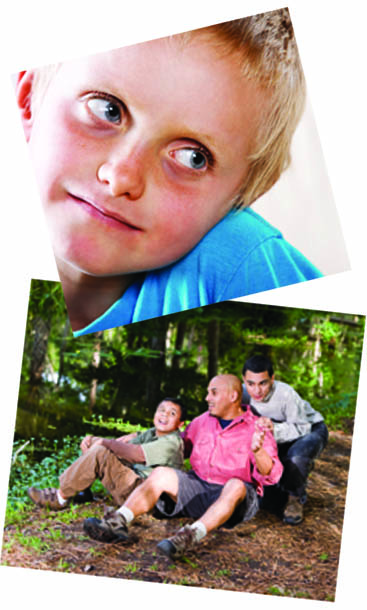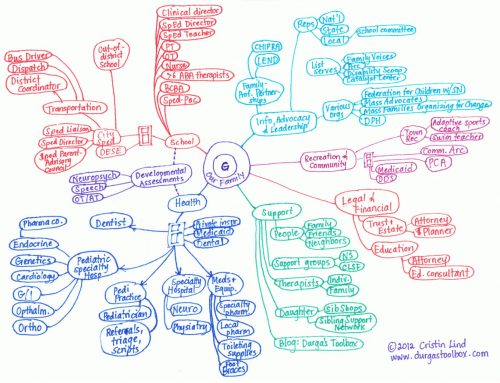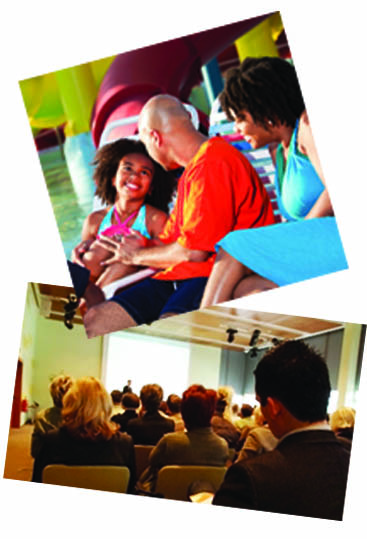Families Helping Families
In Wisconsin, there are many ways to support families with children with special needs. As you consider your child’s needs and what would be a good fit for your family, consider both formal and informal supports available in your community. If a formal support is not available due to a waiting list, consider what informal supports could help you and your child.
It can be helpful to get to know other families who have children with similar health issues. Hospitals, clinics and family resource centers sometimes host parent support groups. Contact your Children’s Resource Center to find out if there are support groups meeting in your area.
https://www.dhs.wisconsin.gov/cyshcn/resource-centers.htm
Below are some family-to-family organizations that can help:
Connecting Families is a network of culturally and linguistically responsive peer support in the state of Wisconsin for families of children and youth with special health care needs (CYSHCN). We help families connect with other families through our network and other community partners.
Email: connectingfamilies@waisman.wisc.edu
https://connectingfamilies.waisman.wisc.edu/
Parent to Parent of Wisconsin is a statewide network of families who support each other on the journey of parenting children with special needs by providing a one-to-one connection with another parent who has a similar experience. Trainings are provided for parents who feel ready to become Support Parents.
833-361-6300
https://p2pwi.org/
Family Voices of Wisconsin provides information, training and leadership opportunities so that families can be informed and effective partners in their child’s care and in influencing the systems that support them.
608-220-9598
https://familyvoiceswi.org/
Wisconsin Family Ties is a statewide, parent-run nonprofit serving families that include children with social, emotional and behavioral needs. Wisconsin Family Ties provides advocacy, information, training, and support for families and professionals through parent peer specialists who are available throughout the state.
800-422-7145
https://www.wifamilyties.org/
There are diagnosis-specific organizations with local or regional chapters. These organizations can connect you to other families and can provide support and resources.
Examples include:
- Autism Society of Greater Wisconsin
https://www.autismgreaterwi.org/ - Autism Society Affiliates in Wisconsin
Find your affiliate
https://www.autismgreaterwi.org/wisconsin-autism-affiliates/ - Down Syndrome Association of Wisconsin (DSAW)
866-327-DSAW
https://www.dsaw.org/ - Epilepsy Foundation
800-693-2287
https://epilepsywisconsin.org/ - Spina Bifida Wisconsin, Ltd (SBWIS)
(414) 607-9061
https://www.sbwis.org/
Families with children who are deaf/hard of hearing/deafplus:
- Under three years old:
Parents Reaching Out
https://connectingfamilies.waisman.wisc.edu/parents-reaching-out/ - Three years and older:
WESP Parent Mentor Program
262-728-7112
http://wesp-dhh.wi.gov/
There are also organizations that support families who care for children with and without special needs.
Examples include:
Definition:
What are Informal supports? (also called natural supports)
Informal supports are those supports available through your family or your community that may be available for any child regardless of special need.
Examples include:
- extended family
- friends and neighbors
- faith groups
What are Formal supports? (also called services)
Formal supports are established programs run by an agency or organization that assist families to care for their child or youth with special needs.
Examples include:
- school-based programs
- clinic or hospital based programs
- state or county administered programs

TIME FOR YOURSELF AND YOUR RELATIONSHIPS
Having a child with special needs can take a lot of time and energy and have an impact on the whole family. Remember, in order to take the best care of your child, you need to take time for yourself !
Taking time for your spouse, your partner, your other children and friends is also important. Carving out time to get away (e.g., taking a walk or going to see a movie)can create balance in your life and positively impact your ability to care for those you love. Information on caring for yourself as a caregiver can be found at:
Family Caregiver
800-445-8106
https://www.caregiver.org/taking-care-you-self-care-family-caregivers
BROTHERS & SISTERS
Siblings often have the longest-lasting familial relationships. ● Many of the estimated 6.5 million individuals with developmental disabilities (I/DD) in the United States have brothers and sisters. ● The peer nature of the relationship makes siblings uniquely positioned to support their brothers and sisters with disabilities to lead self-determined lives. This support can include many areas such as employment, voting, transportation, relationships and sexuality, healthcare, housing supports, and more.
Sibling Leadership Network
 SIBLINGS
SIBLINGS
Siblings of children with special needs sometimes need additional support. There are groups that can connect siblings to siblings from different families and to helpful information.
- WisconSibs
920-968-1742
Email: info@WisconSibs.org
https://wisconsibs.org/
SERVICE AND CARE COORDINATION
DEFINITION
American Academy of Pediatrics Policy Statement - November 2005
“Care coordination is a process that facilitates the linkage of children and their families with appropriate services and resources in a coordinated effort to achieve good health.”
 Some programs provide care coordination. In these programs, a case manager or service coordinator will assist you to identify and connect with community supports. Examples include the Birth to 3 and the Children’s Long-Term Support (CLTS) Waiver programs. Your child’s doctor or other clinic staff may also assist your family in coordinating your child’s services and supports.
Some programs provide care coordination. In these programs, a case manager or service coordinator will assist you to identify and connect with community supports. Examples include the Birth to 3 and the Children’s Long-Term Support (CLTS) Waiver programs. Your child’s doctor or other clinic staff may also assist your family in coordinating your child’s services and supports.
While some families have this type of help, it is common for parents to provide care coordination for their own child. This can be an intimidating and overwhelming experience for families; however, resources exist to help minimize these feelings.
One way to stay organized is to start a care notebook. A care notebook is a system for organizing medical, school and other records, appointments,providers and notes.
An example of a care notebook is available at:
Building Your Care Notebook
https://northernregionalcenter.org/medicalhome/notebooks/
Some families find it helpful to prioritize their next steps or goals. The GPS (Getting Parents Started) Form in Appendix A is a simple tool to help families work on their goals.
CARE MAPPING
Care Mapping is a family-centered process that visualizes a family’s strengths and communicates both the big picture and the small details of all the resources needed to support a child and their family. Your Children’s Resource Center (CRC) offers offers trainings on the importance of creating a care map for your family and on “how-to” create a care map.
Find your CRC here: https://www.dhs.wisconsin.gov/cyshcn/resource-centers.htm
CONFERENCES AND TRAININGS
We all help ourselves by learning more. Conferences and trainings allow you to meet other families and provide an opportunity to learn new information that can help your child.
 Several of organizations offer scholarships or provide trainings at no cost to participants. There are several good online resources to keep families updated on trainings and other learning opportunities.
Several of organizations offer scholarships or provide trainings at no cost to participants. There are several good online resources to keep families updated on trainings and other learning opportunities.
Below are some examples of conferences and training opportunities:
- Waisman Center Days with the Experts are six annual educational events focused on autism, cerebral palsy, cochlear implants, Down syndrome, Augmentative and Alternative Communication (AAC), and Fragile X syndrome that feature advances in research, clinical services and self-advocate/family panels.
https://www.waisman.wisc.edu/outreach/waisman-center-day-with-experts/ - Autism Society of Greater Wisconsin (ASGW) has an annual statewide conference and local affiliates have workshops and training for parents and families.
http://www.autismgreaterwi.org/conferences/ - TheCircles of Life Conference is for families of children with disabilities and special health care needs and the professionals who support them.
https://familyvoiceswi.org/circles-of-life-conference/ - Did You Know? Now You Know! trainings from Family Voices of Wisconsin provide information on how to navigate health care and community supports.
https://familyvoiceswi.org/learn/ - Children Come First Conference is an annual conference for families and providers caring for or working with children with mental, emotional or behavioral needs.
https://www.wifamilyties.org/children-come-first-conference/ - Endless Possibilities Conference invites families and professionals who support students with disabilities to learn and grow together. We encourage open dialogue between families and professionals to discuss positive solutions for all our students with special needs in Wisconsin. https://wifacets.org/training/endless-possibilities-conference/
Where Families Can Learn More:
- Waisman Center is a University Center for Excellence in Developmental Disabilities and includes the Children’s Resource Center-South.
800-532-3321
https://crcsouth.waisman.wisc.edu/ - Wisconsin Board for People with Developmental Disabilities advocates for the independence and inclusion of people with developmental disabilities. To learn about the Board’s legislative and state budget priorities, grant opportunities and their advocacy network.
608-266-7826
https://wi-bpdd.org/ - Wisconsin Family Assistance Center for Education, Training and Support (WI-FACETS) holds both in-person and telephone trainings for families about a variety of educational issues.
877-374-0511
http://www.wifacets.org/training
Leadership Training
Leadership training can help you get more involved in your community and can assist you to become a more effective advocate for your child and other children as well. Some leadership training opportunities in Wisconsin include:
- Parents in Partnership (for parents of children ages 6 to 21).
www.wspei.org/families/pip.php - Youth in Partnership with Parents for Empowerment (for youth together with their parents).
www.wspei.org/families/yippe.php - Partners in Policymaking (a multiple weekend training for individuals with disabilities and parents who have children up to age 21).
https://wi-bpdd.org/index.php/partners-in-policymaking/ - Advocacy for Change is a one-day advocacy skills and strategies training for parents/family members.
https://familyvoiceswi.org/advocacy-for-change/
CHILD CARE & RESPITE
What is Respite Care? “Respite is temporary relief for caregivers and families who are caring for people with disabilities or other special needs such as chronic or terminal illnesses…”
Respite Care Association of Wisconsin

In most cases families will either have to pay for the services or have another source of funding, which could include the Children’s Community Options Program (CCOP) or Children’s Long-Term Support (CLTS) Waiver.
For information about respite care in Wisconsin, contact:
Respite Care Association of Wisconsin has funding/caregiving grants if you are waiting for county funds or don’t qualify for county funding. They also provide a searchable database to help locate respite and on-line training for family or friends to learn how to provide respite.
https://respitecarewi.org/
There is also a Medicaid benefit called personal care services. For an eligible child, this service includes a person who comes to the family home and can help with daily chores, such as bathing, dressing, toileting, and feeding. Some families experience this help as a break or respite from caregiving.
- Medicaid Personal Care Services
(A Family Voices of Wisconsin Fact Sheet)
https://familyvoiceswi.org/resource-library/medicaid-personal-care-services/
RECREATION/COMMUNITY ACTIVITIES
Participating in recreational and other community activities is important for all children, including children with special needs.
 While your child may need extra support to take part in an activity, most schools and other sponsoring organizations can work with you to find ways for your child to fully participate.
While your child may need extra support to take part in an activity, most schools and other sponsoring organizations can work with you to find ways for your child to fully participate.
Examples include:
- play groups
- faith-based groups and activities
- scouts
- clubs and sports at school
- YMCA
There are camps, community programs and activities that are specifically set up for children with special needs. Your CYSHCN Regional Center can provide contact information for programs in your community.
Some examples include:
- Special Olympics
800-552-1324
https://www.specialolympicswisconsin.org/ - Easter Seals Wisconsin
800-422-2324
https://www.eastersealswisconsin.com/
LEGAL ASSISTANCE
Legal questions may come up as you consider care and services for your child. Sometimes your health care benefits or the rights of your child may be unclear and getting legal help may be necessary. Below are organizations available to assist you. There may be a fee associated with this assistance.
- ABC for Health (Advocacy and Benefits Counseling for Health) is a public interest law firm dedicated to ensuring health care access for children and families, particularly those with special needs. They can provide health benefits counseling on health coverage and benefits, and in certain situations, legal representation to families experiencing low income.
800-585-4222
https://www.safetyweb.org/ - Disability Rights Wisconsin is a private non-profit organization that defends the rights of individuals with disabilities throughout the state.
800-928-8778
http://www.disabilityrightswi.org - Wisconsin Judicare is a law firm that provides legal assistance to individuals, including those with low income, living in northern Wisconsin
http://www.judicare.org/ - Legal Action of Wisconsin is a law firm that provides legal services, through staff and volunteer attorneys, to families having low income. They serve 39 southern Wisconsin counties in the areas of housing, consumer, family, public benefits and drivers’ licenses and expungement law.
855-947-2529
https://www.legalaction.org/




